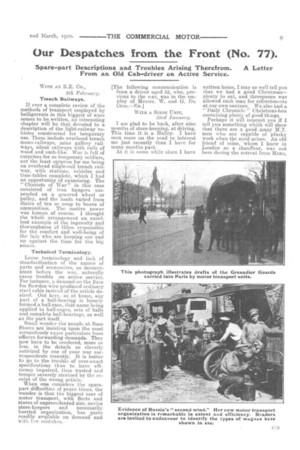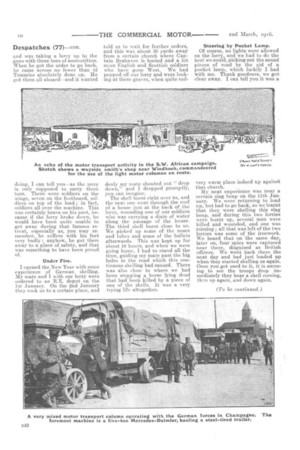Our Despatches from the Front (No. 77).
Page 9

Page 10

If you've noticed an error in this article please click here to report it so we can fix it.
Spare-part Descriptions and Troubles Arising Therefrom. A Letter From an Old Cab-driver on Active Service.
WITH AN R.E. CO., 8th February.
Trench Railways.
If ever a complete review of the methods of transport employed by belligerents in this biggest of wars comes to be,written, an interesting chapter will be that devoted to a description of the light-railway vehicles constructed for temporary use. These include overhead trench mono-railways, mine gallery railways, silent railways with rails of wood and such-like. War is full of surprises for us temporary soldiers, not the least surprise for me being an overhead single-rail trench railway, with stations, vehicles and time-tables complete, which I had an opportunity of examining. The " Chariots of War" in this case ecrnsisted of iron hangers suspended on a grooved wheel or pulley, and the loads varied from dixies of tea or soup to boxes of ammunition. The motive power wa-s human of course. I thought the whore arrangement an excellent example of the ingenuity and thoroughness of th'ose responsible for the comfort and well-being of the lads who are keeping our end up against the time for the big smash.
Technical Terminology.
Loose terminology and lack of standardization of the names of parts and accessories, so inconvenient before the war, naturally cause trouble on active service. For instance, a demand on the Base for Bowden wire produced ordinary steel cable. instead of the article desired. Out here, as at home, any part of a ball-bearing is loosely termed a ball-race, that name being applied to ball-cages, sets of balls and complete ball-bearings, as well as the part itself.
Small wonder the people at Base Stores are insisting upon the most scrupulously exact particulars from officers forwarding demands. They now have to be rendered, more or less, in the details so cleverly satirized by one of your war correspondents recently. It is better to go to the trouble of over-exact specifications than to have efficiency impaired, time wasted and temper severely strained by the receipt of the wrong article. When one considers the sparepart difficulties of peace times, the wonder is that the biggest user of motor transport, with fleets and stores of unprecedented size, novice store-keepers and necessarily hurried organization, has parts readily available on demand and with rew mistakes. [The following communication is from a driver aged 52, who, previous to the war, was in the employ of Messrs. W. and CI. Du Ores—En.]
WITH A SIEGE UNIT,
23rd January.
I am glad to be back, after nine months of store-keeping, at driving. This time it is a Halley. I have seen more on the road to interest inc just recently than I have for many _months past.
As it is some while since I have written home, I may as well tell you that we had a good Christmas— plenty to eat, and threepence was allowed each man for refreshments at our own canteen. We also had a " Daily Chronicle" Christmas-box containing plenty of good things.
Perhaps it will interest you if I tell you something which will show that there are a good ,many M.T. men who are capable of plucky work when the need arises. An old friend of mine, whom I knew in London as a chauffeur, was out here during the retreat from Mons
and was taking a lorry up to the guns with three tons of ammunition. When he got the order to go hack, he came across no fewer than 42 Tornmies absolutely done up. He got them all aboard—and it wanted
doing, I can tell you—as the lorry is only supposed to carry three tons. There were soldiers on the wings, seven on the footboard, soldiers on top of the load ; in fact, soldiers all over the machine. This was certainly brave on his part, because if the lorry broke down, he would have been quite unable to get away during that famous retreat, especially as, you may remember, he suffers with his feet very badly ; anyhow, he got them away to a place of safety, and that was something to have been proud of.
Under Fire.
I opened the New Year with some experience of German shelling. My mate and I with our lorry were ordered to an R.E. depot on the 1st January. On the 2nd January they Look us to a certain place, and told us to wait for further orders, and this was about 30 yards away from a certain church where Captain Brabazon is buried and a lot more English and Scottish soldiers. who have gone West. We had popped off our lorry and were looking at these graves, when quite sud denly my mate shouted out " drop down," and I dropped promptly, you can imagine.
The shell burst right over us, and the next one went through the roof of a house just at the back of the lorry, wounding one of our soldiers who was carrying a dixie of water along the passage of the house. The third shell burst close to us. We picked up some of the noses and tubes and some of the bullets afterwards. This was kept up for about 10 hours, and when we were going home, I had to stand all the time, guiding my mate past the big holes in the road which this continuous shelling had caused. There was also close to where we had been stopping a horse lying dead that had been killed by a piece of one of the shells. It was a very trying life altogether.
Steering by Pocket Lamp.
Of course, no lights were allowed on the lorry, and we had to do the best we could, picking out the sound pieces of road by the aid of a pocket lamp, which luckily I had with me. Thank goodness,, we got clear away. I can tell you it was a,
very warm place indeed up against that church,
My next experience was near a certain slag heap on the 11th January. We were returning to load up, but had to go back, as we learnt that they were shelling this slag heap, and during this two lorries were burnt up, several men were killed and wounded, and one was missing ; all that was left of the two lorries was some of the ironwork. We heard that on the same day, later on, four spies were captured near there, disguised as British officers. We went back there the next day and had just loaded up when they started shelling us again. Once you get used to it, it is amusing to see the troops drop immediately they hear a shell coming, thm up again, and down again.




















